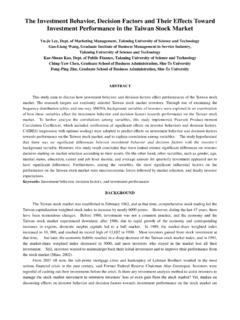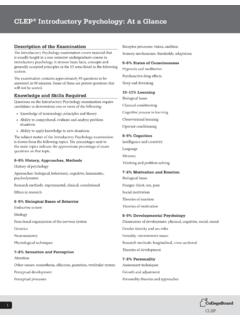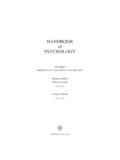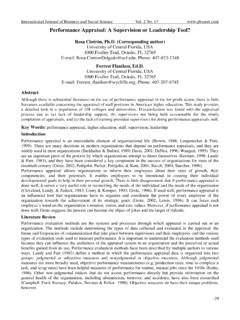Transcription of 1 What is Scientific Thinking and How Does it …
1 1. what is Scientific Thinking and How does it Develop? Deanna Kuhn Teachers College Columbia University In U. Goswami (Ed.), Handbook of Childhood Cognitive Development (Blackwell). (2nd ed., 2010). Author address: Box 119. Teachers College Columbia University New York NY 10027. 2. what does it mean to think scientifically? We might label a preschooler's curious question, a high school student's answer on a physics exam, and scientists' progress in mapping the human genome as instances of Scientific Thinking . But if we are to classify such disparate phenomena under a single heading, it is essential that we specify what it is that they have in common.
2 Alternatively, we might define Scientific Thinking narrowly, as a specific reasoning strategy (such as the control of variables strategy that has dominated research on the development of Scientific Thinking ), or as the Thinking characteristic of a narrow population ( Scientific Thinking is what scientists do). But to do so is to seriously limit the interest and significance the phenomenon holds. This chapter begins, then, with an attempt to define Scientific Thinking in an inclusive way that encompasses not only the preceding examples, but numerous other instances of Thinking , including many not typically associated with science.
3 what IS Scientific Thinking ? Scientific Thinking as knowledge seeking Is Scientific Thinking of any relevance outside of science? In this chapter I answer this question with an emphatic yes and portray Scientific Thinking as a human activity engaged in by most people, rather than a rarefied few. As such, it connects to other forms of Thinking studied by cognitive psychologists, such as inference and problem-solving. In particular, I highlight its connection to argumentive Thinking (Kuhn, 1991) and characterize its goals and purposes as more closely aligned with argument than with experimentation (Kuhn, 1993; Lehrer, Schauble, &.)
4 Petrosino, 2001). Scientific Thinking is most often social in nature, rather than a phenomenon that occurs only inside people's head. A group of people may rely jointly on Scientific Thinking in pursuing their goals. To fully appreciate Scientific Thinking , it must be situated in a developmental framework, with a goal of identifying both its origins and endpoints. These endpoints are more general than the practices and standards of professional science. The most skilled, highly developed Thinking that we identify here is essential to science, but not specific to it.
5 The definition of Scientific Thinking adopted in this chapter is knowledge seeking. This definition encompasses any instance of purposeful Thinking that has the objective of enhancing the seeker's knowledge. One consequence that follows from this definition is that Scientific Thinking is something people do, not something they have. The latter we will refer to as Scientific understanding. When conditions are favorable, the process of Scientific Thinking may lead to Scientific understanding as its product. Indeed, it is the desire for Scientific understanding -- for explanation -- that drives the process of Scientific Thinking .
6 Scientific Thinking and Scientific understanding The distinction between Scientific Thinking and Scientific understanding is an important one, since there has arisen in recent years an extensive literature on children's developing understandings in the domains of physics, biology, and psychology (see Gelman & Kalish, 2006, for review). From their earliest years, children construct implicit theories that enable them to make sense of and organize their experience. These early theories are most often incorrect, as well as incomplete.
7 In a process that has come to be referred to as conceptual change, these theories are revised as new evidence is encountered bearing on them. Knowledge acquisition, then, is not the accumulation of isolated bits of knowledge, but, rather, this process of conceptual change. In contrast to the sizable body of knowledge that has accrued regarding the content of children's evolving theories within specific domains, less is known about the process by means of 3. which theory revision is accomplished. It is this process that is the concern of the present chapter.
8 How is theory revision possible, is there a single process by means of which it occurs, and where does Scientific Thinking come into this picture? From an applied, educational perspective, as well as a theoretical one, the process of theory revision assumes particular significance. Enhanced understandings of Scientific phenomena are certainly a goal of science education. But it is the ability to advance these understandings that depends on Scientific Thinking and is at least as important as an educational goal. On the grounds that there is no rigid dividing line between informal and formal theories (Kuhn & Pearsall, 2000), we refer here to any cognitive representation of the way things are, no matter how simple, implicit, or fragmentary, as a theory, rather than reserve the latter term for theories meeting various formal criteria that might be invoked (Brewer & Samarapungavan, 1991.)
9 Wellman & Gelman, 1998). We can claim, then, that in the early years of life, theories and theory revision are common, as children seek to make sense of a widening array of experience. This early theory revision shares two important attributes with Scientific Thinking . First, both involve the coordination of theory and evidence -- a characterization of Scientific Thinking common to most contemporary accounts of it (Bullock, Sodian, & Koerber, in press; Klahr, 2000; Klahr, Fay, &. Dunbar, 1993; Klahr & Simon, 1999; Koslowski, 1996; Kuhn, 1989; Kuhn, Amsel, & O'Loughlin, 1988; Lehrer & Schauble, 2006; Zimmerman, 2000, 2007).
10 Second, both can lead to enhanced understanding. There is one important difference, however, between the two. Unlike Scientific Thinking , early theory revision occurs implicitly and effortlessly, without conscious awareness or intent. Young children think with their theories, rather than about them. In the course of so doing they may revise these theories, but they are not aware that they are doing so. The modern view of Scientific Thinking as theory-evidence coordination, note, can be contrasted to the pioneering work on Scientific Thinking by Inhelder and Piaget (1958).






